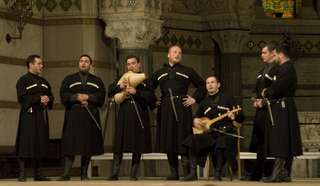|
Back
Praising God, Mocking Oxen New York
Starr Theatre, Alice Tully Hall
08/13/2010 -
Johann Sebastian Bach: Jesu, meine Freude
Traditional Georgian Polyphony (Church, Wedding, Farm, Work, Chants)
György Ligeti: Lux aeterna
Iannis Xenakis: Nuits
Ensemble Basiani, George Donadze (Artistic Director), Ars Nova Copenhagen, Paul Hillier (Director), Artist-in-residence, Introduction by Pierre-Laurent Aimard

Ensemble Basiani (© Ensemble Basiani)
”No need to remember when,/For everything old is new again.”
That popular song was referring to the difference of perhaps ten years. In this astonishing program, hosted by Pierre-Laurent Aimard, the first of four devoted to the art of polyphony, the difference between old and new is about ten centuries.
It was extraordinary because two totally different choruses took part, alternating their selections. The great Paul Hilllier led Ars Nova Copenhagen–their double-entendre title referring to both 13th Century Ars Nova and music of today–in music of the Baroque and the 20th Century. The other choir came from Tbilissi, dressed in authentic Georgian black formal wear (mins their swords, which wouldn’t have made it on the plane!), they sung Georgian works dating back to the 10th Century.
The similarities of a few works were unparalleled. I am thinking especially of the Georgian Easter service, and Ligeti’s Lux aeterna. The Georgian music could have easily been 20th Century (Stravinsky noted the harsh dissonances and strange modulations). Each of the twelve singers took melodic fragments at different times, sometimes interfering with each other, sometimes with more orthodox harmonies. The sounds were soft, mysterious, but certainly not of the world we know.
(And yes, one have preferred incense and gorgeous vestments and huge Slavic crucifixes, but Alice Tully Hall had to suffice.)
Now we came to Ligeti’s Lux aeterna, one of the less quoted works from Kubrick’s 2001. Simply because–like the Georgian music–it was unquotable. Again we had singers, 16 of them, each with different notes, each seemingly improvised. Ligeti pointed to this as an experiment in stasis. But one could say the same thing for the Georgian music.
One could almost say the same for Xenakis' Nuits, the only French word in a 12-minute experiment of phonemes, ancient Sumerian and Medean sounds (the piece was commissioned by the Shah of Iran), as well as hisses, minor ululations and whistling. Yet the effect was so un-worldly that I expected my Georgian neighbors in the hall to listen with avidity. Alas, they tried but had come for their own country’s music, so the Xenakis made little sense to them.
But they had every right to cheer on the Georgian music. Much of it was very very solemn indeed. One listened carefully to the strange counterpoint and harmonies, but one also needed the Church to begin to feel the emotions.
But we still had a great diversity of emotions. The opening 12th Century Wedding song seemed to be like a 14th Century organum, where one line was the chant, and the chorus sung variations above this. Yes, we had the chant, the variations, and suddenly the whole piece swung into a different scale, the tempo changed, the chant became transformed.
We had one work where the leader, George Donadze, picked up the chondur, a lean lute-like instrument, to accompany a song commemorating espionage and a 14th Century battle, with some remarkable contrapuntal lines.
Two very secular works were brilliant. My favorite was Chela, the woes of a Georgian farmer. He takes his problems out on his two oxen, named Chela and Buska, calling them “weak-willed, heartless, neck-drooping, slaves.” All of this with near-falsetto, with different tunes from the singers, with a rolling cart-like, accordion-breathing atmosphere.
(Some in the audience didn’t get the taunting, since they, poor souls, didn’t understand Megrelian, the language of the lyrics. The program provided an English translation, but nothing can beat “Here Chela! Here Buska!” in the original Mergelian)
The last pieces were working songs, bringing Ensemble Basiani at their exuberant best. The sounds, the interweaving lines, the real excitement was infectious. They should easily have encored this piece to the standing-ovation audience, but marched off as solemnly as they had entered.
Ars Nova Copenhagen gave tip-top performances for the aforementioned Xenakis and Ligeti. The women especially had ripe open voices, the conducting under Paul Hillier was absolutely meticulous.
The opening was more conservative, Bach’s third motet, Jesu, meine Freude, where Ars Nova gave a performance as dramatic as a choral opera. The work tells the story of Jesus not objectively, but from the viewpoint of a believer, who sees hell and heaven and witnesses the agony of the Christ. Mr. Hillier took his group through the ecstasies and the agonies, and at the end–with the solace of “Jesus, my true joy”–their notes were both beautiful and beatific.
Harry Rolnick
|